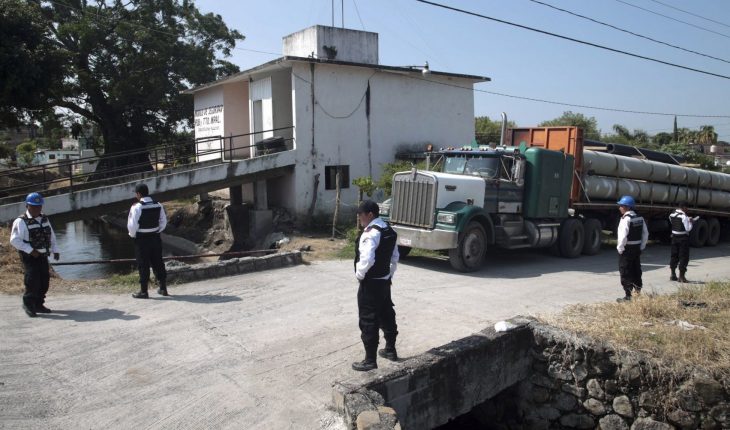Agents of the National Guard evicted in the early morning the plant installed in San Pedro Apatlaco, municipality of Ayala, in Morelos, to reactivate the construction of the pipe that will connect the Wastewater Treatment Plant of Cuautla with the thermoelectric plant built in Huexca, Morelos. For four years, ejidatarios from Ayala and Tlaltizapán had been locking to prevent the construction of the work, which would allow the operations of the thermoelectric plant, part of the Integral Morelos Project (PIM) to begin.
The uniforms were deployed after 2 a.m. and forced the 10 people at both points of the planton on both banks of the Cuautla River to leave the site. The seed was erected four years ago by environmental activists including Samir Flores, who was killed on February 20, 2019.
“Following the GN came the machines and workers to restart the work of the aqueduct and began to place sheet walls to avoid free transit and the right of defense and manifestation of those who are aggrieved by this megaproject,” the Peoples’ Front in Defense of Earth and Water said in a statement.
Find out: Huexca says no to the consultation and thermoelectric plant; government boasts success of participation
The CFE, responsible for the thermoelectric plant, explained that the intervention of the National Guard came as strategic facilities, “for the purpose only of safeguarding the national heritage”. According to this statement, the operative was attended by the public fedariums Gerardo Cortina Mariscal, Notary Public No. 12 in Cuernavaca, Morelos and Jesús Toledo Saavedra, Notary Public No. 2 in Yautepec, Morelos and also president of the College of Notaries of the state of Morelos, “who attested that the events were carried out peacefully, since the 10 people who were on the floor agreed to retire voluntarily”.
Juan Carlos Flores, a lawyer at the Peoples’ Front in Defense of Earth and Water, explained that ejidos are gathered and that protests are likely to be provoked.
“It is important to note that there is currently no legal impediment to the restart of the works or the start of operations of the generating power plant, as there is no order of judges to prevent it,” the CFE said in a statement. Two months ago, President Andrés Manuel López Obrador announced that work would be revived to launch the thermoelectric plant arguing that there are no longer any protections against it.
The Manuel Bartlett-led institution further argued that the project gained community support in the February consultation. That vote took place just two days after the murder of Samir Flores and the communities most affected by the installation of the thermoelectric plant did not participate. In addition, the CFE claimed to have signed an agreement with 26 ejidos and nine small properties, members of the Association of Users of the Cuautla River (ASURCO). Animal Politics requested a copy of this document, but the CFE stated that it is “not public” and that it is also not intended to advertise it.
Read: Won no in Huexca, but YES in the region
Opponents of the project reject the government version. Lawyer Juan Carlos Flores, of the Front of Peoples in Defense of the Land and Water Morelos, Puebla, Tlaxcala, assured that there are 19 protections presented by various ejidos. Of these, according to Flores, 9 have suspension over water use and do not allow the flow of water from the Cuautla River to be reduced. “The protections are still in force,” Flores insisted.
The Morelos Integral Project is a plan consisting of two thermoelectric plants located in the municipality of Huexca, a 160-kilometer-long pipeline that runs between 60 communities in the states of Morelos, Tlaxcala and Puebla, and a 12-kilometre aqueduct between the municipalities of Ayala and Huexca, Morelos.
Activists who oppose the project argue that the project has been imposed without giving a choice to a consultation that respects the parameters of ILO Convention 169, which regulates the right to consultation of indigenous peoples. They warn about the health and environmental risks of implementing infrastructure.
The CFE, for its part, ensures that the project meets all legal requirements. “If this work were not carried out, the CFE power plant, which cost 25 billion pesos, built with money from the Mexican people, would become scrap metal,” he said.
What we do at Animal Politics requires professional journalists, teamwork, dialogue with readers and something very important: independence. You can help us keep going. Be part of the team.
Subscribe to Animal Politics, receive benefits and support free journalism.#YoSoyAnimal
translated from Spanish: National Guard evict planting against Huexca thermoelectric planting
November 23, 2020 |





